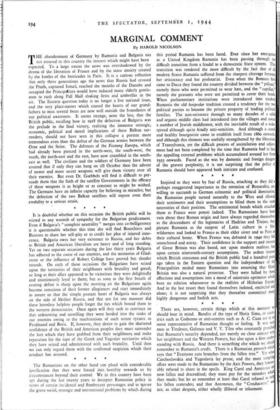The Rumanians on the other hand can plead with considerable
justification that they were forced into hostility towards us by circumstances beyond their control. We in this country have been apt during the last twenty years to interpret Rumanian policy in terms of certain incidental and flamboyant personages and to ignore the grave social, strategic and international problems by which during
this period Rumania has been faced. Ever since her emergence as a United Kingdom Rumania has been passing through the difficult transition from a feudal to a democratic State system. This transition was rendered the more difficult by the fact that of all modern States Rumania suffered from the sharpest cleavage between her aristocracy and her proletariat. Even when the Romans fast came to Dacia they found the country divided between the "pilletai,” namely those who were permitted to wear hats, and the "capillati," namely the peasants who were not permitted to cover- their heads. When parliamentary institutions were introduced into modern Rumania the old hospodar tradition created a tendency for the two political parties to become the private property of leading political families. The non-existence through so many decades of a solid and organic middle class had introduced into the villages and towns a number of Jewish middlemen, with the inevitable result of a wide- spread although quite kindly anti-semitism. And although a sound and healthy bourgeoisie came to establish itself from i860. onwards, and although this element was usefully strengthened by the liberation of Transylvania, yet the difficult process of assimilation and adjust. ment had not been completed by the time that Rumania had to face the appalling external problems which accumulated around her from 1933 onwards. Faced as she was by domestic and foreign dangers of the gravest perplexity, it is not surprising that the policy of Rumania should have appeared both intricate and confused.


























 Previous page
Previous page